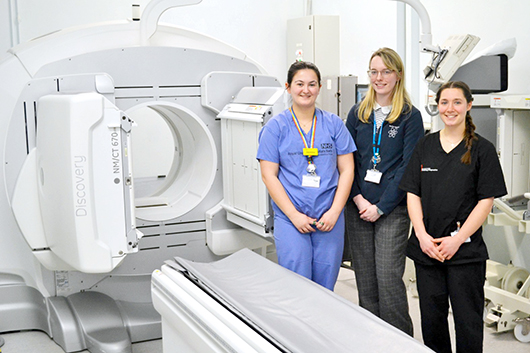Media Release
Date: 11 March 2024
RUH supports new generation of healthcare science staff
New healthcare science staff are choosing to start their careers at the Royal United Hospitals Bath (RUH) NHS Foundation Trust thanks to a range of training programmes offering them vital hands-on experience.

The programmes enable trainees to get essential experience of working in a busy clinical setting, while also completing a university degree.
Healthcare science staff make up just 5% of the total NHS workforce but are involved in 80% of all clinical decisions made in the health service.
There are over 50 specialisms in healthcare science and the RUH has healthcare scientists and practitioners in many different departments across the hospital.
These include Medical Physics and Clinical Engineering, Pathology and Blood Sciences, Vascular Science, Respiratory and Sleep Science, Audiology, Neurophysiology, and Cardiac Science.
Three of the RUH's current trainee healthcare science staff all took different routes to start their careers at the hospital.
Based in our Nuclear Medicine department, Jasmine Overall is on a Level 6 apprenticeship, studying for a degree in Medical Physics Technology in partnership with the University of the West of England (UWE).
Jasmine, who is on track to become a Nuclear Medical Clinical Technologist, said: "For me, it's been the perfect route to become a qualified healthcare scientist. The learning is really hands-on so I've been able to hit the ground running and know that I've really contributed to the work of the team.
"It's a patient-facing role too, which I really enjoy. I'll set up patient scans, insert cannulas and even manage radioactive substances that we use in our scans."
Jane Blackbourn, who works in the RUH's Cardiology department, is on a fast-track 18-month echocardiography training programme.
Already a sports science graduate, she said: "I left university with a sports science degree, but I still wasn't sure exactly what I wanted to do. When I found out about this post-graduate training programme it really appealed to me.
"The training has been so good and I'm hoping to become a fully-qualified echocardiographer. I'm involved with a lot of the patient scans and have learnt so much in such a short space of time. It's really hands-on and the RUH is a very good place to train – so much research is fed into our daily practice."
Lydia Davidson works in the Medical Physics department at the RUH. She is on the three-year NHS Scientist Training Programme.
"It's more of a behind the scenes role which focuses mainly on patient and staff safety," she said. "We have a lot of different responsibilities, including training staff, testing machines to make sure they are in good working order and carrying out risk assessments.
"It's been a fantastic training programme and the role itself is great. I enjoy applying physics to something really meaningful like patient safety – it means I can directly, positively influence how people receive their care."
This week is national Healthcare Science Week (11-15 March). You can find lots more information about the different specialisms involved in healthcare science and the training opportunities available on the NHS website:
See the RUH website for the latest recruitment opportunities:
ENDS

